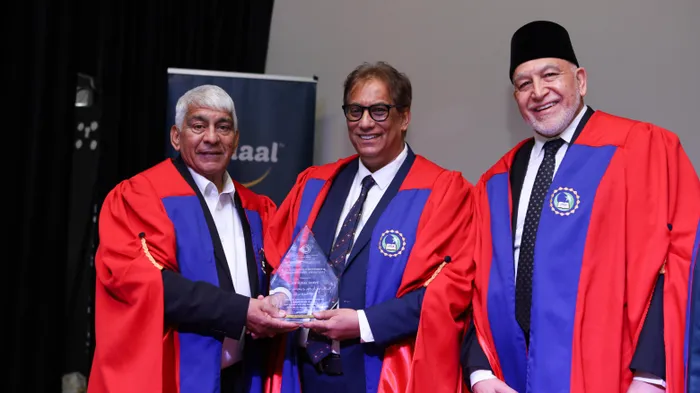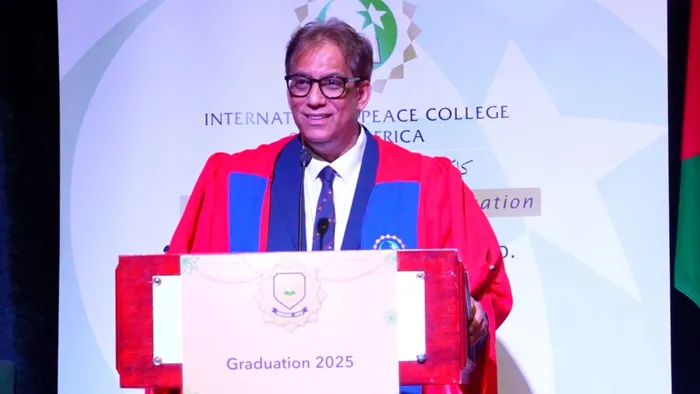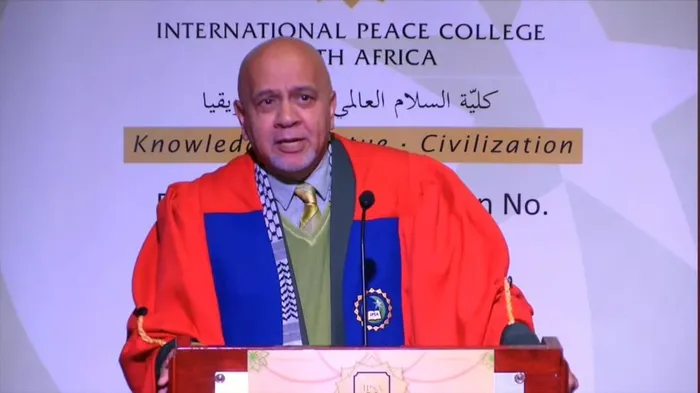Dr Iqbal Survé receives business and philanthropy award and calls for a new human renaissance

Dr Iqbal Survé, middle, receives an award at the 2025 graduation ceremony of the International Peace College South Africa.
Image: supplied
Artificial Intelligence can analyse data and diagnose problems, but it cannot care.
This was the central message of Dr Iqbal Survé, patron and founder of the Survé Family Office and chairperson of the Sekunjalo Group, in his keynote at the 2024 International Peace College South Africa (IPSA) graduation ceremony, where he was honoured with the IPSA Business Achievement and Philanthropy Award 2025, calling for leadership grounded in ethics, empathy, and human purpose.
The recognition reflected Dr Survé’s lifelong commitment to using enterprise as a force for good, building inclusive economies, expanding access to education, and championing ethical leadership in the modern world. As founder and chairman of Sekunjalo Investment Holdings, his career has been defined by transformation, innovation, and philanthropy.
Through Survé Philanthropies and several educational foundations, he has empowered thousands of young South Africans to study, innovate, and lead. On the global stage, his work through the World Economic Forum, BRICS Business Council, and other international bodies has positioned him as a voice for the Global South, a leader who connects technology with humanity, and business with purpose.
Below is an adapted version of his speech:

Dr Iqbal Survé delivers a speech at the 2025 graduation of the International Peace College South Africa.
Image: Supplied
The age of artificial intelligence and human purpose
Dr Survé began by reminding graduates that while technology continues to reshape every corner of society, its purpose must remain human. Artificial Intelligence, he explained, represents not just a technological revolution but a human one, a challenge to rethink how we learn, work, and live.“Technology can process data,” he said, “but it cannot care. It can diagnose, but it cannot comfort the sick.”
For him, AI should extend human potential, not replace it. Its value depends entirely on the ethics of those who build and use it. “If we program it with greed, it divides. If we program it with empathy, it heals,” he said, a moral equation that places humanity, not machinery, at the centre of progress.
Lessons from a life of learning
Drawing from his journey through medicine, entrepreneurship, media, and technology, Dr Survé reflected on how every discipline offers insight into the other. As a young doctor witnessing the arrival of computers in hospitals, he learned that efficiency means little without empathy.
As an entrepreneur, he saw how technology could connect nations but also manipulate truth. Each experience, he told graduates, taught him that true intelligence is not artificial; it is moral. Conscience, compassion, and courage remain the foundation of progress in any era.
The role of the humanities
In a world racing toward automation, Dr Survé championed the enduring relevance of the humanities - philosophy, literature, the arts - disciplines that ask why, not just how.
“When machines begin to think, philosophers must ask what thought really means. When algorithms define truth, we need journalists to defend it,” he said. These fields, he argued, are the “moral operating system of the modern world.”
Without them, innovation risks becoming amoral, powerful yet purposeless.

Professor Muhammad Haron speaks at the graduation ceremony of the International Peace College South Africa.
Image: Supplied
Work, ethics, and lifelong learning
To the graduates stepping into an uncertain future, Dr Survé offered both realism and hope. The world ahead, he said, will reward adaptability, humility, and purpose. “Do not expect comfort or certainty. Expect opportunity, and use it to serve.”
He urged them to measure success not by wealth but by wisdom, and to treat integrity as a lifelong discipline. “Do no harm,” he reminded them, a doctor’s oath that, he believes, should guide every profession. Education, he said, does not end with a degree. It is a dialogue with the world, one that grows deeper through curiosity, humility, and service.
“When you educate one person,” he said, “you transform a community.”
The new human renaissance
As he closed, he called on graduates to lead what he termed a "new human renaissance", a movement that redefines progress through empathy and ethical intelligence. “Be humble in success, curious in failure, and generous in wisdom,” he told them. “Work hard, but work with heart. Dream, but dream for others, not just for yourself.”
In an age when algorithms learn faster than humans, his message was a powerful reminder that the future belongs not to machines, but to those who remember what makes us human.